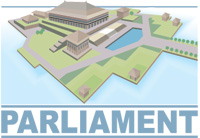Columns
To the hustings as President dissolves 7th Parliament; UNP’s minority Govt. survives
After weeks of speculation, President Maithripala Sirisena signed the Presidential decree bringing to and end the term of the 7th Parliament of the Democratic Socialist Republic of Sri Lanka, 10 months ahead of its 6-year term. The dissolution came a little more than two months later than the day he had pledged to do so at the completion of the 100-day programme as per his election manifesto, and it couldn’t have come any sooner, given the fact that the minority Government led by the United National Party (UNP) that he installed in office, was becoming increasingly ineffective in the face of growing opposition in the Legislature.
 When Parliament met this week amidst growing speculation of a dissolution by the end of the week and questions over three no-confidence motions against the UNP minority Govt and its ministers, it was abundantly clear that the 20th Amendment to the Constitution, which President Sirisena had been passionate about getting approved by the House, was a non-starter. It also exposed the growing unease within an alliance of parties that had helped thrust President Sirisena to power, in a surprise win at the January 8 presidential poll.
When Parliament met this week amidst growing speculation of a dissolution by the end of the week and questions over three no-confidence motions against the UNP minority Govt and its ministers, it was abundantly clear that the 20th Amendment to the Constitution, which President Sirisena had been passionate about getting approved by the House, was a non-starter. It also exposed the growing unease within an alliance of parties that had helped thrust President Sirisena to power, in a surprise win at the January 8 presidential poll.
The UNP, President Sirisena’s main backer in the January 8 Presidential poll, took the unprecedented step of proposing an Adjournment motion to discuss the 20th Amendment for Tuesday and Wednesday, which had been gazetted the week earlier. The normal course was for the gazetted Bill to be tabled in Parliament two weeks later, following which, its Constitutionality could be challenged in the Supreme Court. It is only after the court ruling reaches the House that a debate would have taken place.However, the surprise move to hold an Adjournment debate showed the UNP’s lack of interest in getting the 20th Amendment passed by this Parliament. The debate also allowed other smaller parties in Parliament to air their disapproval of the Electoral Reforms envisaged in the 20th Amendment.
Prime Minister Ranil Wickremesinghe who spoke during the debate, said the draft was a good document for discussion and spoke on the need for a wider debate on Electoral Reforms before they get Parliamentary approval. However, one of his Cabinet colleagues, Minister and Sri Lanka Muslim Congress (SLMC) leader Rauff Hakeem, was less polite in his approval of the proposed changes.
He especially took a dig at one of his Cabinet colleagues who he did not name but hinted at, as one “having presidential dreams” of stifling his voice from being heard at Cabinet meetings regarding Electoral Reforms. His frustration clearly showed when he went as far as to say that, in their haste to see the back of former President Mahinda Rajapaksa, they may have got themselves into a bigger muddle.
With the dissolution of parliament midnight Friday, the no-confidence motions against the UNP government lapse. The 7th Parliament first met on April 22, 2010, following the election held on April 8, when the United People’s Freedom Alliance(UPFA) won 144 seats, while the UNP won 60 seats, the Ilankai Tamil Arasu Kadchi ITAK/TNA) won 14 seats and the Democratic National Alliance (DNA) 7 seats.
Between then and now, several MPs crossed over from the UNP to the UPFA, chief among them, members of the SLMC who had been elected on the UNP ticket, following which the Government of the former president secured a two-thirds majority in the House, a feat many thought unattainable under the Proportional Representation (PR) system.
The DNA, under which the Janatha Vimukthi Peramuna (JVP) contested too, disintegrated with the 3 JVP MPs going it alone and others functioning separately. Field Marshal Sarath Fonseka who was elected from the DNA, subsequently lost his seat in Parliament after being jailed, and his seat filled by Jayantha Ketagoda who later extended his support to the UPFA.
The new Parliament will see several changes, chief among them being its term in office limited to 5 years as per the provisions of the 19th Amendment to the Constitution. The power of the President to dissolve the Legislature after a year too, will no longer be effective. He can do so only after the House functions for at least four-and-a-half-years.
With reduced powers to the executive under the 19th Amendment, the new Parliament will have more powers to function more effectively and independently, if the correct Legislators are voted into office.


Leave a Reply
Post Comment